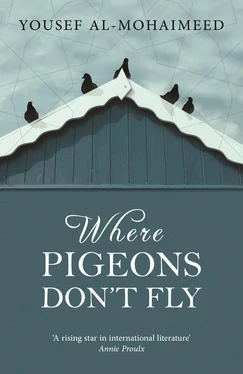All she remembered of her childhood was the bad and the sad, starting with being named Tarfah and, perhaps too, the superstition with which her immediate family and relatives poisoned her early years: that any woman called Tarfah was destined for bad luck in life. Though she hadn’t believed it, the years that followed had proved them right.
It was a mystery to her why her entire family should prefer her older sister, Asma. Was it because of her utter docility, the very opposite of Tarfah’s naughtiness? Or because Tarfah excelled at school while her older sister failed and had to repeat one year after another until they ended up together in the fourth year at primary school, before Tarfah overtook her and went to middle school first? Tarfah relied on her own talents, while her sister received assistance from private tutors, all to no avail. Was that really sufficient to make her family hate her, so that as a girl she often felt that she wasn’t their daughter at all, that she was in the wrong family? Neither their ideas nor their way of life tallied with her own and comparing her dark skin to her four fair sisters only made her more doubtful. When she was older and her father had died she would ask herself, ‘Did Mum sleep with someone else?’
Not a day passed without her being beaten for some reason, or for no reason at all, by her brutal father and her brothers. Even her youngest brother took pleasure in hurling his sandals at her when she walked by, as though she were a cat in the doorway that he wanted to drive off.
Nor was this confined to the immediate family; even her aunt preferred Asma. Yet despite her father’s harsh treatment he would call no one else when he wanted food, drink or clothes. Was it because she was more scrupulous than her sister, or because he wished to put Asma at ease and have the little servant girl Tarfah perform her tasks for her?
Her father had not loved her mother. She would complain about him, never letting him alone and always suspicious. One morning, months after his death, she told Tarfah that he had cheated on her, and the whore he’d cheated with had borne him a child.
‘That’s enough, Mum!’ Tarfah had cried. ‘Please, stop it! God rest his soul!’ Then added in a subdued tone, ‘Speak well of your dead.’
But the terror she felt at night as she looked back over her long life and her sense of alienation while surrounded by her family only grew stronger. She remembered that it had been her father’s dream to be blessed with a daughter who mispronounced her ‘rs’ to sound like ‘ls’. Maybe his lover had had this flaw of speech and he had longed to see it embodied in front of him at home. Tossing and turning in bed, Tarfah whispered to herself, ‘So why did he hate me if I fulfilled this dream of his?’
She never won his love and was helpless before her siblings’ mockery whenever she uttered a word that contained an ‘r’. They would mimic her and one would always shout: ‘I dare you to say, “Rabbits run right to rocks”!’
Tarfah was exceptionally brave and had a sharp tongue, but she never had it in her to tell her mother what she went through as a child for fear that she would punish her and step up her surveillance. She couldn’t find the courage to tell her about her cousin, some five years older than her, who had asked her to come to his house to see the hawk his father had bought. She went off with him and he had shown her a hawk of his own.
For days afterwards she felt irritable and guilty and when she saw him at the door would hate and blame herself, as though he had been perfectly within his rights and it was she who had done wrong. She was scared that he would tell on her; the sin was her own.
Tarfah neither hated nor loved her father, though by rights she should have loved him because he was her father. Whenever she grew angry with him and whispered to herself that she hated him she would quickly become flustered and fearful of divine retribution, even though she couldn’t remember him ever holding her or hugging her or stroking her hair; the very opposite of her uncle, who adored her, showering her with praise in front of her family and his own daughters, too, and never hesitating to give her a hug every time he saw her. In his tender embrace she found all that she lacked in her family home.
When her father died, Tarfah wept dementedly and cried in silence for a whole month, so that the women who had come to pay their condolences pitied her and called back later to ask after her. She cried like a child, repeating over and over, ‘Bring back my father!’ But with the passing of days she grew reconciled to circumstances and on the final day of her mother’s mourning period, as she sat with her in the still night, her mother told her what had never been told: how he had once made accusations against her honour, how he had done her wrong and abused her.
She talked of the girl he had loved before he had got married and how his family had refused to let him wed her, forcing him to marry her mother because she was a cousin and an orphan and his financial circumstances were weak enough that only his cousin, cheap and no bother, was within his means and he within hers. She told Tarfah how he had betrayed her with the girl he got pregnant and Tarfah had been unable to stop her until she had convinced her daughter that it had really happened.
Her mother had shattered that dazzling aura, the barrier of sanctity surrounding her father. What disappointment Tarfah felt! How she hated her mother for destroying the image of a strong father that she carried inside her! Yet she hadn’t blamed her.
To this day, Tarfah was amazed that her mother had observed the mourning period and carried out his last instructions (for the woman who observes the prescribed period of mourning shall make for her husband a dwelling in Paradise), continuing to give alms on his behalf and refusing to remarry. If his name ever came up she would praise him and perfume his memory before her sons and daughters, who came to feel proud of him.
Tarfah almost wept when she learnt of his betrayal and the pride felt by her brothers and sisters never touched her. She would laugh to herself to see them squirreling his portrait away in the wallets they carried in their pockets. She was the only one who didn’t keep a picture of him; she wouldn’t even look at one. She feared herself and she feared him. She sensed she would catch a look of reproach in his eyes, a reproach that would seize on the doubts that swirled inside her, stirred up by her revulsion at what her mother had told her.
These things kept Tarfah awake at night as she grew older and the passing of time eroded her hostility towards her family. She began to draw closer to them, to live alongside them in peace, until she married Sami and divorced two years later to return with quite different feelings. The gulf between them had grown and she felt more estranged than at any time before. Her room became her refuge and her world. True, her brothers certainly appeared to treat their sisters with kindness, alarmed and jealous for their well-being, but Tarfah thought them selfish and fake.
Over the years she tried to bridge the chasm dividing them. She was, undeniably, disobedient and foolish with an ungovernable tongue. She was incapable of keeping her counsel for anyone, answering back fearlessly. For that is how she saw herself: fearless and restoring what was rightfully hers. They, meanwhile, regarded her behaviour as vulgar, as a shamelessness and insolence that contrasted with her calm, well-mannered sisters. Tarfah thought them naïve idiots, mocking their staggering stupidity and laughing herself silly when they failed at school, and so nobody was ever happy for her when she did well.
— 40 —
IN SPITE OF HER relationship with her father, Tarfah still wished that he had been there when she got engaged to Sami.
Читать дальше












